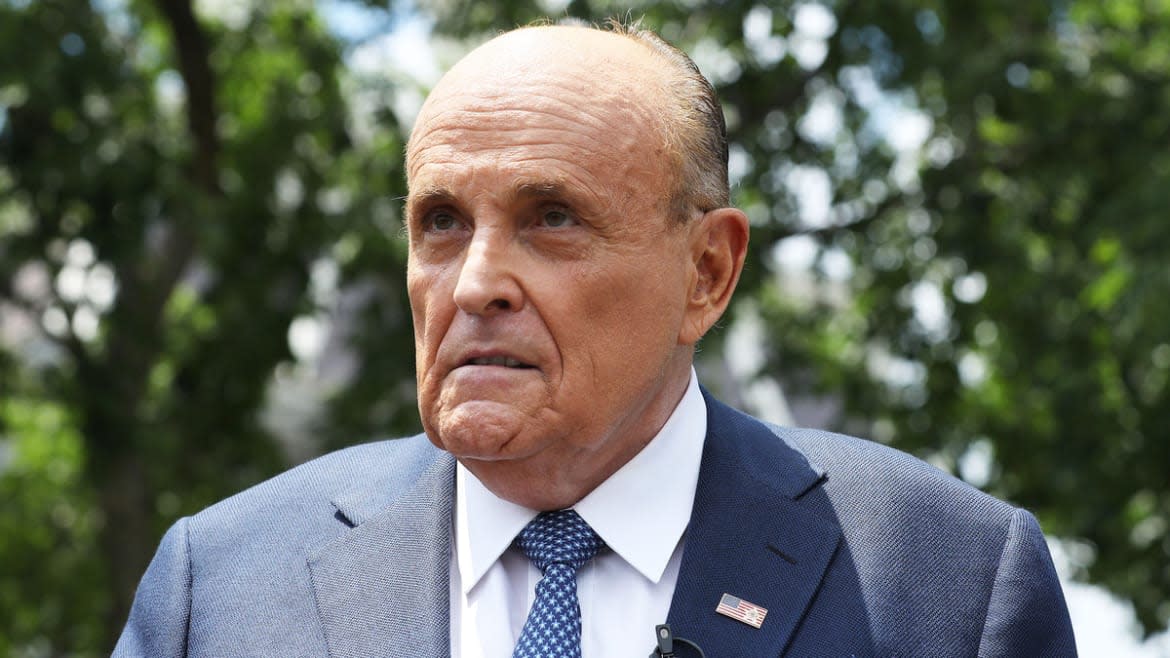It’s Time to Take Away Rudy’s Law License

- Oops!Something went wrong.Please try again later.
When Rudy Giuliani launched into his usual bombastic conspiracy theories this week, it wasn’t in a tweet or at a press conference next door to a porn shop or on Fox News but in a federal courtroom, where he was appearing as Donald Trump’s attorney and where he lied to a judge. There need to be consequences.
All lawyer jokes aside, legal ethics are a big deal, not least because they are indispensable to a functioning court system. If lawyers can lie without consequence, making up facts whenever they want, then our trials and hearings will become farces.
And that’s exactly what happened in Pennsylvania on Monday, as Rudy talked about everything from Rahm Emanuel’s theory of crisis management to President Carter’s “prophetic” warnings about mail-in voter fraud and a tirade against supposed “mafia-like” behavior by Philadelphia election officials—none of it related to the legal case he was supposed to be making.
The painful monologue screeched to a halt whenever Rudy hit the guardrails of judicial questioning. Asked the most important question in nearly any election lawsuit, what standard of review should apply, he was caught completely off guard. For non-lawyers, it’s hard to explain just how appalling this is. Standard of review is the sort of thing that every first-year law student learns. But rather than agreeing with the judge that the case demanded “strict scrutiny,” or arguing that it called for rational basis review, he simply advocated for “the normal one.” If legal Twitter had a voice in that moment, the scream would have been heard around the world.
But the responses got even worse on difficult legal questions. Take his answers on standing, the doctrine that determines whether your case should be heard in federal court. It’s one of the most confounding areas of American law, but not to Rudy, who proclaimed “I went to law school… I thought it was a simple test.” It’s not.
All of this was bad lawyering, but it wasn’t unethical. But what Rudy did next crossed a line: he lied. He didn’t spin, argue, or put his best take on the evidence, he flat-out lied to a judge in open court. For that, he should lose his law license.
Actually, Rudy’s first lie came before he ever set foot in the Pennsylvania courthouse. On Tuesday morning, Rudy petitioned to represent the Trump campaign, which is a routine step for lawyers appearing out of state. If you aren’t licensed to practice in a court, you have to request permission to argue. Sadly, Rudy couldn’t complete this two-page form without committing perjury. Rudy claimed to be licensed in the District of Columbia, where in fact he’s currently suspended for not paying his dues.
This is a big deal. Getting suspended from the bar for non-payment is bad, but making a false statement about it is much worse. And if anyone should know better, it would be the former prosecutor who put people behind bars for these sorts of misstatements, whether it was lying to an FBI agent or perjury in court.
But lying about his own credentials was the prelude to the real fireworks: Rudy’s lies, unsupported by any facts he introduced to the court, about the election itself. Among other lies, Rudy claimed that hundreds of thousands of Pennsylvania ballots were counted without Republican observers. False. He claimed over one million votes were cast illegally in Pennsylvania. False. And he even said “they” (presumably President-elect Biden and his campaign) “stole” the election through widespread, national voter fraud. False.
Giuliani Rants About Mickey Mouse and Voter Fraud in Hearing on Trump Suit
We’ve all been inundated with this sort of noxious disinformation, and it’s easy to get desensitized to public officials and their representatives openly lying about our election. But those lies take on new power and pose new dangers when they’re offered in court.
Many of Trump’s other lawyers have been careful to avoid crossing this line, knowing that it could cost them their law license. A week before Rudy appeared in court, Jonathan Goldstein was questioned about evidence of voter fraud in Pennsylvania and repeatedly gave the lawyerly dodge: “To my knowledge at present, no.” Goldstein was willing to bring a baseless lawsuit in court, he was willing to argue against the integrity of our elections, but he wasn’t willing to lie.
That’s why Tuesday night I sat down and filled out my first legal ethics complaint, asking New York’s Attorney Grievance Committee to investigate one Rudolph William Louis Giuliani. Maybe they’ll throw it in the trashcan, maybe they’ll take it seriously, but either way it’s time for the legal profession to respond.
We need to address not just Rudy, but the ways lawyers have engaged in unethical behavior throughout the Trump administration. If we want to claim we’ve an ethical profession, we have to live up to the standards we set for ourselves. As I wrote in my complaint:
“While I recognize that Mr. Giuliani is a senior member of the bar with a history of public service, his experience should require him to meet a higher standard, not excuse behavior that would be readily sanctioned in a more junior attorney. I urge you to show all New Yorkers that our ethical rules will be applied against all attorneys, even those who are powerful, prominent, and politically well connected.”
Get our top stories in your inbox every day. Sign up now!
Daily Beast Membership: Beast Inside goes deeper on the stories that matter to you. Learn more.

